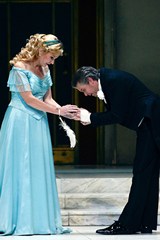| Opera Reviews | 6 May 2024 |
An elegant and touching Arabellaby Tony Cooper |
|
| Strauss, R: Arabella Semperoper Dresden October 2015 |
|
|
The set designer, Martina Segna, took full advantage of the theatre’s spacious stage especially the wings coming up in Act I with three laterally-moving spaces showing the three hotel rooms occupied by Graf Waldner and his family forced from their own home due to reduced circumstances mainly caused by the Count running up gambling debts by the dozen. In the final two acts, the action centred upon the hotel’s grand entrance hall built in marble and adorned with ornate Corinthian pilasters and such like sporting bell-boys by the dozen. Kurt Rydl and Janina Baechle were a brilliant pairing as the impoverished aristocrats Graf Waldner and Gräfin Adelaide working well off each other bringing so much comedy to their respective roles. And the scene where the Countess - eccentrically dressed and finished off with a dark-green plumed headdress - has her fortune told, it was amusing down to the core. The prediction: Arabella will marry a rich man but trouble may be in store. Excitement and nerves rolled into one left the old girl needing a whiff of smelling-salts to bring her round. The cast, however, was admirably led by Anne Schwanewilms who put in a stunning and commanding performance in the title-role while the trouser role of her mischievous sister, Zdenka, was magnificently sung and acted by Genia Kühmeier. Their big number in Act I: the well-known sister duet - ‘Ich danke Fräulein…aber der Richtige’ - was dramatically convincing, full of poetry, feeling and emotion, but above all delivered with ease and utter graciousness. And the performance put in by Íride Martínez as Die Fiakermilli at the Coachman’s Ball, the opener of Act II, was equally as charming. Martinez enjoys a good stage presence whose body language more than depicts her flirtatious behaviour. And, of course, just the right person to ignite a masked ball. And it was at the ball where Arabella recognises the love of her life, Mandryka, at first a quick glance across a busy room, then on to more familiar territory, but not before muddling intervention by Zdenka confusing the relationship and causing utter mischief surrounding a supposed secret rendezvous between Arabella and Matteo (whom she’s eyeing up) completely misinterpreted by Mandryka, the role played and eloquently sung by Bo Skovhus while Benjamin Bernheim sang Matteo in a bumptious and frustrated manner. But before Arabella can settle down with her rich Croatian-born bear-hunting husband (we even had a character dressed as a bear on stage) there’s a trio of suitors for her to ward off and Schwanewilms revelled in the scene when sending them packing to the delight of a packed and excited house. The disappointed trio of Counts: Martin Homrich (Graf Elemer), Clemens Unterreiner (Graf Lamoral) and Derek Welton (Graf Dominik) more than made their mark on a production I found outstanding not least by the direction and a stellar cast but by some stylish costume design, the work of Anna Sofie Tuma, while a ray of lighting by Bernd Purkrabek put more than a shine on members of the chorus particularly in the ball scene where they were all kitted out in top hat and tails finished off with white gloves and canes in traditional Broadway fashion. Fred Astaire, step aside! A romantic comedy, though, needs a romantic ending and it comes with Arabella quietly appearing at the back of the stage with Schwanewilms turned out radiantly dressed in an ankle-length aquamarine-coloured dress looking a princess all the way while Mandryka sits head bowed and forlorn with his back to her ruminating over their squabbles manifested by a forged letter conjured up by Zdenka involving poor old Matteo in the plot. As Arabella approaches him she offers him a glass of water signifying reconciliation and marriage - an old Germanic custom, it seems. He drinks and tosses the empty glass away. They embrace. Zdenka, of course, gets her man. All is forgiven! A nice tidy ending! Christian Thielemann, music director of the Semperoper, worked wonders in the pit with the Staatskapelle Dresden. An authoritative and well-respective conductor on the works of Strauss and, indeed, Wagner, he kept a perfect balance between the stage and the pit with the orchestra promptly having their say in a fine rendering of the prelude that precedes Act III.
|
|
| Text ©
Tony Cooper Photo © Matthias Creutziger |

 Strauss’ Der Rosenkavalier, produced in 1911 when the composer was 47, is his greatest operatic achievement and popular the world over. Arabella, in stark contrast, composed 21 years later, is not nearly so popular. Both operas, however, are comedies set in Vienna, both are famous for including the waltz and both call for a nice young girl to regale herself in male attire.
Strauss’ Der Rosenkavalier, produced in 1911 when the composer was 47, is his greatest operatic achievement and popular the world over. Arabella, in stark contrast, composed 21 years later, is not nearly so popular. Both operas, however, are comedies set in Vienna, both are famous for including the waltz and both call for a nice young girl to regale herself in male attire. 





